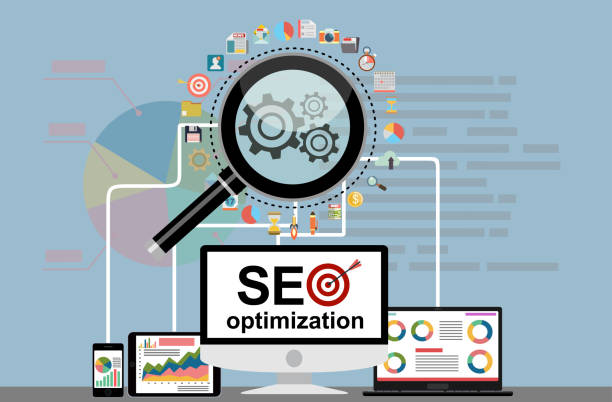What is Off-Page SEO and Why is it Important?

#Off_Page_SEO, or Off-Page SEO, refers to a set of activities performed outside your website with the goal of increasing your site’s credibility, authority, and ranking in search engine results.
Unlike On-Page SEO, which focuses on optimizing content and structure within the site, Off-Page SEO deals with signals sent to your site from other sources.
The most important and well-known aspect of Off-Page SEO is link building or acquiring backlinks from other websites.
However, Off-Page SEO is not limited to links and includes activities such as brand mentions, social media signals, and even online reviews.
The importance of Off-Page SEO lies in the fact that search engines like Google rank websites based on the level of credibility and trust other sites place in them.
Backlinks act as a “vote of confidence” or “reference” from one site to another; the greater the number and quality of these votes, the more your site’s credibility and trust increase with the search engine.
In fact, even if you have fantastic content on your site, without a strong Off-Page SEO strategy, you might never reach the deserved position in search results.
For this reason, a deep understanding of the nature of Off-Page SEO and its proper implementation is essential for any online business.
This section serves as an explanatory and educational introduction, laying the groundwork for understanding other topics related to Off-Page SEO.
Many businesses face the question of how to increase their online credibility; the answer largely lies in the successful implementation of Off-Page SEO.
Ignoring this section can mean losing a large volume of organic traffic and potential customers, which in itself adds an analytical aspect to this topic.
In fact, search engines use complex algorithms to evaluate websites, and Off-Page SEO is considered one of the main pillars of these algorithms.
A powerful Off-Page SEO strategy can make a significant difference in a website’s visibility and success.
Many SEO experts believe that even after complete On-Page SEO optimization, without sufficient attention to Off-Page SEO, reaching top rankings is difficult and almost impossible.
This area requires patience, meticulous planning, and continuous execution, as its results are often visible in the long term.
However, investing in it is definitely worthwhile, as it leads to increased domain authority, improved keyword rankings, and ultimately, growth in organic traffic and profitability.
Therefore, it can be said that Off-Page SEO is not just an option, but a necessity for any site that aims to succeed in online competition.
Does your company’s website create a professional and lasting first impression in the minds of potential customers? Rasaweb, with its professional corporate website design, not only represents your brand’s credibility but also paves the way for your business growth.
✅ Create a strong and trustworthy brand image
✅ Attract target customers and increase sales
⚡ Get free consultation
The Role of Backlinks in Off-Page SEO Strength

At the heart of #Off_Page_SEO lies the concept of #backlinks.
Backlinks are links that point from one website to another.
Search engines consider backlinks as “votes of confidence” or “references” from other websites to your site.
The greater the number and quality of these votes, the more authoritative and trustworthy your site appears to search engines.
This authority is known as “Domain Authority” and plays a very important role in your site’s ranking.
This topic covers a specialized and explanatory aspect of Off-Page SEO.
The history of Google’s algorithms, including the PageRank algorithm, is based on backlink analysis.
Although PageRank is not publicly disclosed, its core concept of valuing links remains valid in modern Google algorithms.
A backlink from a highly authoritative site, such as a reputable newspaper or a well-known university, is far more valuable than dozens of backlinks from low-authority or spammy sites.
The quality of backlinks depends on multiple factors: the linking site’s Domain Authority, the topical relevance of the linking site to your site, the link’s placement within the content, and the link’s Anchor Text.
The anchor text, i.e., the words used as the link, also conveys an important message to search engines and should be relevant to the destination page.
The impact of backlinks on Off-Page SEO is very profound.
They not only help improve rankings but also bring referral traffic to your site.
This traffic can be highly targeted, as users are directed from a relevant site to yours.
Therefore, focusing on building quality and relevant backlinks is the cornerstone of any successful Off-Page SEO strategy.
Without strong backlinks, even with the best content and internal optimization, achieving top rankings for competitive keywords will be very difficult.
This is due to the inherent importance of links in how search engines understand the web.
They view links as a sign of connection, trust, and authority between websites, and this perspective forms the main foundation for evaluating and ranking web pages on the internet.
Understanding how backlinks not only help increase your site’s authority but also assist search engines in better understanding your site’s topic is crucial.
This process has its complexities and requires a strategic and continuous approach.
For instance, a link from a reputable news site about your industry not only gives you more credibility but also convinces Google that your site is specialized in that area.
This is a key factor in improving your Off-Page SEO and overall site ranking.
Types of Backlinks and How to Determine Their Quality

In the realm of #Off_Page_SEO, understanding the types of backlinks and how to determine their quality is crucial for any #Off_Page_SEO_success link-building strategy.
Not all backlinks are created equal, and they hold different values for your site.
Generally, there are two main categories of backlinks: Dofollow links and Nofollow links.
Dofollow links allow search engines to pass “authority” or “link juice” from the linking site to your site, while Nofollow links typically do not pass this authority.
However, Nofollow links can still generate referral traffic and aid in branding.
This section serves as a specialized and guiding resource for you.
The quality of a backlink depends on several factors.
The first and most important factor is the Domain Authority and Page Authority of the linking site.
A link from a site with high DA, for example, DA 70, is much more valuable than a link from a site with DA 20.
The second factor is topical relevance; a backlink received from a site related to your field of activity has more value.
For example, if your site is about digital marketing, a link from a specialized digital marketing blog is much better than a link from a cooking site.
The link’s position on the page, the anchor text used, and the naturalness of the Anchor Text are also important.
Links placed within the main content and relevant paragraphs are more valuable than links located in the footer or sidebar.
Additionally, using diverse and natural anchor text, including brand name, bare URL, and related keywords, instead of constantly repeating a specific keyword, is recommended to prevent potential Google penalties.
Identifying spammy and harmful links is also very important.
Links purchased from PBNs (Private Blog Networks) or Link Farms, links created unnaturally and in bulk, or links from low-quality and untrustworthy sites, can lead to your site being penalized by Google instead of helping your Off-Page SEO.
Continuous monitoring of your backlink profile and disavowing toxic links is an indispensable part of maintaining your Off-Page SEO health.
For better understanding, the table below compares different types of backlinks and their characteristics:
| Backlink Type | Description | Impact on Off-Page SEO |
|---|---|---|
| Dofollow Link | Passes authority (Link Juice) from the source site to the destination site. | Very positive and crucial for ranking. |
| Nofollow Link | Usually does not pass authority but can increase traffic and branding. | Indirect impact, maintains natural link profile. |
| UGC Link (User Generated Content) | Links created by users (e.g., in comments, forums). | Usually Nofollow, but useful for diversity and naturalness of link profile. |
| Sponsored Link | Paid or promotional links that must be marked with this tag. | Have no direct SEO impact, but prevent penalties. |
Effective Link Building Strategies for Off-Page SEO

One of the most challenging parts of #Off_Page_SEO is implementing effective #link_building strategies.
Link building is an art and a science that requires patience, creativity, and persistence.
The ultimate goal is to acquire high-quality and relevant backlinks from authoritative websites that naturally point to your site.
This section provides a comprehensive and educational guide for you.
Creating Valuable and Shareable Content: The best way to attract natural backlinks is to produce content that others want to link to.
This content can include in-depth articles, case studies, infographics, free tools, or engaging visual content.
Your content should not only provide useful information but also be designed to encourage audiences and other webmasters to share and link to it.
This is the foundation of any successful Off-Page SEO strategy.
Guest Blogging: Writing articles as a guest on other relevant and authoritative websites is one of the most popular and effective link-building methods.
By providing high-quality content to the host website, you can receive one or two relevant backlinks to your site within the article or author’s bio.
This method not only provides you with backlinks but also enhances your credibility as an industry expert and brings referral traffic.
Of course, you must ensure that the host sites are reputable and your guest blogging is high-quality and relevant.
Broken Link Building: This strategy involves finding broken links on relevant websites, creating similar or better content on that topic, and then suggesting to the webmaster to replace the broken link with a link to your content.
This method is also beneficial for the host webmaster, as it helps them improve their site’s user experience and remove dead links.
Relationship Building: Link building isn’t just about sending cold emails.
Building genuine relationships with influencers, webmasters, bloggers, and journalists in your industry can naturally lead to acquiring links.
Participating in industry events, online and offline networking, and collaborating on joint projects are among the ways to build these connections.
Influencer Marketing: Collaborating with influencers and influential figures in your field can lead to receiving brand mentions and quality links from them.
Due to the high authority of influencers, these types of links hold significant value in Off-Page SEO and can greatly increase your site’s visibility.
Ultimately, it’s important to remember that quality always takes precedence over quantity.
Focusing on acquiring a few high-quality links is far more effective than dozens of low-quality and irrelevant links.
Tired of losing customers due to poor e-commerce website design? With Rasaweb, solve this problem permanently!
✅ Increase sales and conversion rate from visitor to customer
✅ Smooth and engaging user experience for your customers⚡ Get free consultation
Other Off-Page SEO Factors Beyond Backlinks

While backlinks form the backbone of #Off_Page_SEO, this domain is much broader than just link building.
Search engines also consider other signals originating from outside the site to evaluate a website’s credibility and position.
Understanding and optimizing these factors can significantly help improve your ranking in search results.
This section provides an explanatory and analytical overview of other important factors in Off-Page SEO.
Brand Mentions: Search engines like Google value your brand name and how often it is mentioned online.
Wherever your brand name is mentioned without a direct link, it acts as a positive signal to the search engine.
These mentions, especially if they occur on news sites, authoritative blogs, or influential social media platforms, can increase your brand’s credibility and show Google that your business is a real and trustworthy entity.
Monitoring brand mentions and, if possible, converting them into dofollow links, is a smart strategy in Off-Page SEO.
Social Signals: Although social media links are usually nofollow and do not directly pass SEO authority, activity and sharing of your content on platforms like Twitter, Facebook, LinkedIn, and Instagram can indirectly help SEO.
Increased shares, likes, comments, and followers indicate to search engines that your content is engaging and valuable, and that users are interested in it.
This can lead to increased direct traffic to your site and, in turn, encourage search engines to revisit and re-evaluate your content.
Online Reviews: User reviews on platforms like Google My Business, Yelp, TripAdvisor, and product comparison websites play a significant role in Local SEO and your brand’s overall credibility.
Numerous positive reviews not only attract potential customers’ trust but also signal to search engines that your business is reputable and popular.
Encouraging satisfied customers to leave reviews and responding to them, whether positive or negative, is a vital part of your Off-Page SEO strategy.
Forums and Communities: Participating in forums and groups related to your industry, answering user questions, and providing useful information can lead to targeted traffic and sometimes quality backlinks (even if they are nofollow).
These activities help you become recognized as an expert in your field and ultimately contribute to your brand’s overall credibility and Off-Page SEO.
Common Mistakes in Off-Page SEO Implementation and How to Avoid Them

On the path to improving #Off_Page_SEO, many webmasters and SEO specialists may make mistakes that not only harm site rankings but can also lead to severe penalties from Google.
Avoiding these common errors is as important as correctly implementing strategies.
This section is designed as an educational and guiding resource to help you identify and steer clear of common pitfalls in Off-Page SEO.
Buying Backlinks or Participating in Link Networks (PBNs): One of Google’s biggest mistakes and red flags is buying and selling links with the aim of manipulating rankings.
Google strongly opposes such activities, and websites participating in these networks often receive manual or algorithmic penalties that may lead to complete removal from search results.
The focus should always be on attracting natural, merit-based links.
Sudden and Unnatural Increase in the Number of Backlinks: While the number of backlinks is important, their growth speed and pattern are also significant to Google.
A sudden and unnatural increase in the number of backlinks, especially from untrustworthy sources, can be interpreted as a sign of manipulation and the use of black-hat SEO techniques.
Your link profile should grow gradually and organically.
This is a very common and detrimental error in Off-Page SEO.
Over-optimization of Anchor Text: Repeated use of target keywords in link anchor text (Exact Match Anchor Text) can signal to Google that you are trying to manipulate rankings.
Diversity in anchor text, including brand name, bare URL, generic phrases, and related keywords, is crucial for maintaining a natural link profile.
This addresses the questionable content regarding the extent of anchor text optimization.
Ignoring the Quality of Linking Sites: Receiving links from low-quality, spammy, or irrelevant sites is not only worthless but can also harm your site.
Before engaging in any link-building activity, check the authority, topical relevance, and overall health of the linking site.
Using SEO tools to check the Domain Authority and Page Authority of source sites is highly recommended.
This helps prevent damage to your Off-Page SEO.
Lack of Regular Backlink Profile Monitoring: Even if you don’t create bad links yourself, toxic links might point to your site due to competitors (Negative SEO) or other reasons.
Regularly monitoring your backlink profile and using the Google Disavow Tool to disavow harmful links is essential for maintaining your Off-Page SEO health.
These errors can severely damage your Off-Page SEO efforts, so recognizing and avoiding them is of paramount importance.
Essential Tools for Analyzing and Improving Off-Page SEO

For success in #Off_Page_SEO, having the right tools to analyze your and your competitors’ backlink profiles, as well as finding new link-building opportunities, is crucial.
These tools allow you to convert complex data into understandable information and make data-driven decisions.
This section serves as a specialized and guiding resource introducing some of the most important Off-Page SEO tools.
Ahrefs: This tool is one of the most powerful and comprehensive SEO tools on the market.
Ahrefs has a massive database of backlinks and allows you to analyze any site’s backlink profile.
You can view lost, new, broken links, as well as used anchor texts.
Ahrefs’ capabilities include competitor analysis, keyword research, and rank monitoring.
For in-depth Off-Page SEO analysis, this tool is unparalleled.
Moz Pro: Moz is also a comprehensive SEO tool suite, with Link Explorer being one of its key features.
This tool allows you to check the Domain Authority and Page Authority for various sites and pages.
Moz also offers tools for backlink analysis, keyword research, and rank monitoring.
DA and PA are important metrics for gauging a site’s Off-Page SEO strength.
Google Search Console: This free tool from Google provides invaluable information about how your site is seen by Google.
You can view your site’s internal and external links, identify broken links, and even notify Google about unwanted links using the Disavow Tool.
Google Search Console is an essential tool for any webmaster who cares about their Off-Page SEO.
Majestic SEO: This tool specializes in backlinks and has introduced two main metrics called “Citation Flow” and “Trust Flow.”
Citation Flow indicates the overall authority of a site based on the number of incoming links, while Trust Flow is calculated based on the quality and trustworthiness of the links.
Majestic SEO is very useful for accurately analyzing link quality.
SEMrush: SEMrush is also a comprehensive SEO tool that offers extensive capabilities in keyword research, competitor analysis, and backlink analysis.
This tool can help you identify your competitors’ link-building strategies and find new opportunities to acquire backlinks.
These tools are essential for any SEO specialist who works seriously on Off-Page SEO.
| Tool Name | Primary Use in Off-Page SEO | Key Feature |
|---|---|---|
| Ahrefs | Comprehensive backlink and competitor analysis | Largest backlink database |
| Moz Pro (Link Explorer) | Domain and page authority check | Domain Authority and Page Authority metrics |
| Google Search Console | Backlink monitoring and toxic link management | Disavow Tool (Free) |
| Majestic SEO | Analysis of link authority and trust flow | Citation Flow and Trust Flow metrics |
| SEMrush | Competitor backlink analysis and opportunity discovery | Comprehensive tools for SEO campaigns |
Measuring Success in Off-Page SEO Campaigns

After implementing #Off_Page_SEO strategies, it is crucial to be able to measure the impact of your efforts.
Measuring success helps you identify effective strategies and reinforce them, while discarding ineffective methods.
This section is an analytical and guiding resource for key success metrics in Off-Page SEO.
Increased Keyword Rankings: The primary indicator of SEO success is the improvement of your site’s ranking for target keywords in search results.
With rank monitoring tools, you can track your progress over time.
If, despite link building, your rankings do not show significant change, you may need to review the quality or relevance of your backlinks.
This is a direct sign of the effectiveness of your Off-Page SEO.
Organic Traffic Growth: An increase in incoming traffic from search engines (organic traffic) is also a vital metric.
Tools like Google Analytics show you how many users have entered your site through search.
Consistent growth in these statistics indicates the success of your Off-Page SEO efforts, as quality backlinks help attract more users.
Increased Domain Authority/Rating: Metrics like Domain Authority (Moz) or Domain Rating (Ahrefs) are a number between 0 and 100 that indicate a site’s overall authority.
While these are not direct Google metrics, they can indicate the extent of your site’s authority increase over time.
Growth in these metrics shows that your link-building efforts are effectively working and indirectly impacting Off-Page SEO.
Increase in Backlink Quantity and Quality: Regular monitoring of new backlinks, the number of referring domains, and their quality through SEO tools is essential.
You should aim for a continuous increase in the number of quality links from diverse and relevant domains.
Additionally, it’s important to monitor the percentage of dofollow links compared to nofollow to maintain a natural link profile.
Reduced Bounce Rate and Increased Time on Site: While these may seem like On-Page SEO metrics, quality backlinks that drive targeted traffic to your site can also help improve these indicators.
More relevant users spend more time on your site and have a lower bounce rate, which in turn sends positive signals to Google about the quality of your content.
Accurate measurement of these metrics helps you optimize your strategies for maximum yield.
Research shows that 80% of customers trust companies with professional websites more. Does your current website attract this trust?
With Rasaweb’s corporate website design services, solve the problem of lack of customer trust and weak online image forever!
✅ Create a professional image and increase customer trust
✅ Attract more sales leads and business growth
⚡ Get free consultation
The Future of Off-Page SEO and Upcoming Trends

The world of #SEO is constantly evolving, and #Off_Page_SEO is no exception.
With technological advancements and the evolution of search engine algorithms, Off-Page SEO strategies must also adapt to these changes.
Understanding upcoming trends can help you prepare for the future and maintain your position in search results.
This section provides an analytical and news-oriented look at the future of Off-Page SEO and likely trends, with a glance at questionable content regarding the impact of artificial intelligence.
Greater Emphasis on Quality and Semantic Relevance: Google is increasingly emphasizing the quality and semantic relevance of links.
In the future, merely having a large number of links will become less effective, and the value of links coming from authoritative sources relevant to your content will increase.
Google’s AI algorithms will be better able to distinguish topical relevance and the true authority of a link.
The Role of AI in Backlink Analysis: Artificial intelligence and machine learning will play an increasing role in how search engines evaluate backlinks.
Smarter algorithms will be able to distinguish natural link-building patterns from manipulated ones.
This creates challenges for SEOs who still resort to black-hat methods and makes the importance of natural Off-Page SEO more pronounced.
Brand Mentions and Entity Signals: The importance of brand mentions without direct links, as well as signals related to brand expertise, authoritativeness, and trustworthiness (E-A-T), will increase.
Google aims to ensure that websites and businesses are real, credible, and reliable.
This means that online reputation management, digital PR, and brand awareness will increasingly become an integral part of Off-Page SEO strategy.
User Experience and User Interactions: While not directly related to Off-Page SEO, an excellent user experience (UX) and positive user interactions with your site can indirectly impact Off-Page SEO.
If users arrive at your site via backlinks and have a poor experience, they might quickly leave, which can send negative signals to Google.
Therefore, ensuring a great user experience indirectly supports the effectiveness of your links.
Importance of Comprehensive and In-depth Content: Producing comprehensive, lengthy, and in-depth content that thoroughly covers a topic will naturally attract more links.
These “link-baits” act as resources for others who want to reference authoritative and comprehensive information.
This approach is the most sustainable way to acquire natural backlinks and maintain your position in the future of Off-Page SEO.
Off-Page SEO in Practice: A Comprehensive Approach

So far, we have explored various aspects of #Off_Page_SEO, from the importance of backlinks to link-building strategies and necessary tools.
Now it’s time to integrate all these concepts into a comprehensive and practical approach.
Success in #Off_Page_SEO not only requires technical knowledge but also demands creativity, patience, and the ability to connect with others.
This final section serves as a comprehensive and explanatory guide, offering a practical and even somewhat entertaining perspective on how to integrate all these factors to achieve sustainable results in Off-Page SEO.
The Foundation: Exceptional Content: No Off-Page SEO strategy can be sustainable without strong, high-quality content.
Before you even start looking for link-building opportunities, ensure your website is filled with content that is worth linking to.
Your content should be unique, accurate, comprehensive, and engaging.
This content can include in-depth articles, case studies, professional infographics, educational videos, or even free tools.
Good content will naturally begin to attract links, and this is the most important step in any Off-Page SEO strategy.
Networking and Digital PR: Off-Page SEO is essentially about building relationships.
Connect with webmasters, bloggers, journalists, and influencers in your industry.
Attend industry events, be active on social media, and answer others’ questions.
Sometimes, a strong relationship can be more valuable than dozens of cold link-building emails.
Links from genuine relationships are more natural and sustainable.
Diversity in Link Building Strategies: Don’t limit yourself to just one or two link-building methods.
A combination of guest blogging, broken link building, authoritative directories, content collaborations, and even leveraging social media for content promotion can help you build a diverse and natural link profile.
The more varied your strategy, the less susceptible you will be to Google penalties, and in fact, your Off-Page SEO will be more robust.
Continuous Monitoring and Adaptability: The world of SEO is not static.
Algorithms change, competitors innovate, and new trends emerge.
Therefore, continuous monitoring of your and your competitors’ backlink profiles, keyword rankings, and organic traffic is essential.
Be prepared to adjust your strategies based on data and market changes.
Flexibility and readiness for continuous learning are key to long-term success in Off-Page SEO.
Finally, remember that Off-Page SEO is a marathon, not a sprint.
Its results may not be immediately visible, but with continuous effort, patience, and a comprehensive approach, you can significantly increase your site’s authority and achieve top rankings in search engines.
This long-term investment, literally, lays the foundation for your digital success and helps you become more visible in the competitive online space.
Frequently Asked Questions
| Row | Question | Answer |
|---|---|---|
| 1 | What is Off-Page SEO? | Off-Page SEO refers to a set of actions performed outside your website to improve its ranking in search engines. These actions include backlink building, social media presence, branding, and more. |
| 2 | Why is Off-Page SEO highly important? | Off-Page SEO shows search engines that your website is credible, popular, and trustworthy. High-quality backlinks from authoritative sites are strong signals for better ranking and help increase your domain authority. |
| 3 | What are the most important components of Off-Page SEO? | The most important components of Off-Page SEO are: Link Building, Content Marketing, Social Media Marketing, Influencer Marketing, and Online Reputation Management. |
| 4 | What is a backlink and why is it important for Off-Page SEO? | A backlink is a link that points from another website to your website. These links act as “votes of confidence” in Google’s view and indicate the credibility of your content. The more backlinks and the higher their quality, the better your site’s ranking will be. |
| 5 | What are the types of backlinks in terms of SEO impact? | The two main types of backlinks include DoFollow and NoFollow. DoFollow backlinks pass authority (Link Juice) and directly affect rankings. NoFollows do not pass authority but can still generate traffic and help maintain a natural link profile. (Also UGC and Sponsored) |
| 6 | How can one create high-quality backlinks for their site? | To build high-quality backlinks, one can use methods such as: creating excellent and shareable content, Guest Posting on relevant and authoritative sites, Broken Link Building, Digital PR, and analyzing competitor backlinks. |
| 7 | What are toxic backlinks and how do they affect a site? | Toxic or spam backlinks are links that point to your site from low-quality, spammy, or irrelevant websites. These backlinks can harm your site’s ranking and even lead to penalties by Google’s algorithms. |
| 8 | What is the role of social networks in Off-Page SEO? | Although social signals (likes, shares, etc.) are not direct ranking factors, they help Off-Page SEO. They increase content visibility, drive direct traffic to the site, and ultimately increase the chance of acquiring natural backlinks and improving brand recognition. |
| 9 | What is the importance of diversity in a backlink profile? | Diversity in a backlink profile means that your links come from various sources (blogs, forums, news sites, directories), with diverse anchor texts, and a mix of DoFollow and NoFollow links. This diversity signals to Google that your link building is natural and organic. |
| 10 | What are the common mistakes in Off-Page SEO that should be avoided? | Common mistakes include: buying backlinks in large volumes from low-quality sources, over-optimization with target keywords, ignoring quality in favor of quantity in backlink building, lack of diversity in the link profile, and neglecting toxic backlinks and not Disavowing them. |
And other services of Rasaweb Advertising Agency in the field of advertising
Smart Advertising Campaign: Designed for businesses seeking to improve SEO ranking through intelligent data analysis.
Smart Digital Advertising: An effective tool for analyzing customer behavior with the help of real data.
Smart Content Strategy: A new service for enhancing campaign management through optimizing key pages.
Smart Data Analysis: Professional optimization for user interaction using attractive UI design.
Smart Conversion Rate Optimization: A fast and efficient solution for digital branding with a focus on attractive UI design.
And over a hundred other services in the field of internet advertising, advertising consultation, and organizational solutions
Internet Advertising | Advertising Strategy | Advertorial
Sources
Complete Off-Page SEO GuideLink Building StrategiesFactors Affecting Off-Page SEOAdvanced Off-Page SEO Training
? Rasaweb Afarin Digital Marketing Agency is your companion and guide on the challenging path of the digital world. By providing services such as website design with modern UI, professional SEO, and specialized content creation, we elevate your business and establish a powerful online presence for you.
📍 Tehran, Mirdamad Street, next to Bank Markazi, Kazeroon Janoubi Alley, Ramin Alley, No. 6

